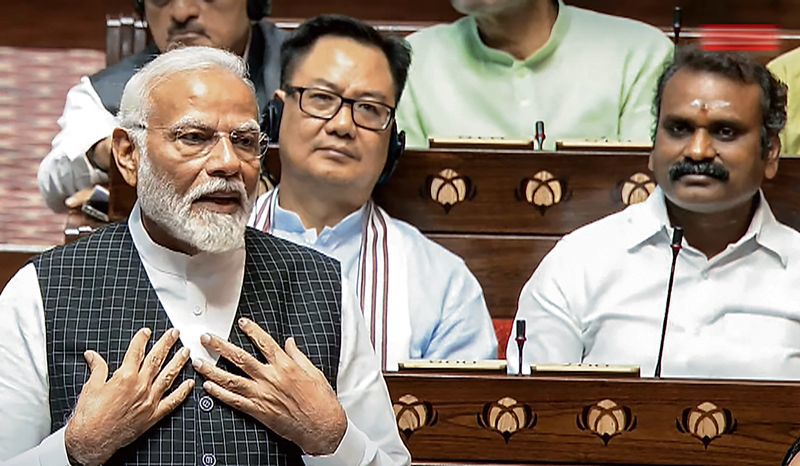Acrimony again trumps parliamentary norms
THE hope that the acrimony of the recent elections and political divisions would be put behind as the 18th Lok Sabha convened has been belied. Both the ruling BJP and the Congress-led Opposition have become more combative, and no accommodation is being shown by either side. In the process, established norms are being abandoned, with both sides blaming each other for doing so. Prime Minister Narendra Modi is attempting to impress upon the nation that the loss of the BJP’s majority in the Lok Sabha will not lead to a material change in either his priorities or the manner in which he has led the government over the past decade. The steps he has taken in government formation and his addresses to both Houses of Parliament make that abundantly clear.
On the other hand, the Congress and its allies are pushing the idea that the BJP’s loss of 63 seats (from 303 in 2019 to 240 this time) has materially altered the political situation and that Modi cannot run the government as he did in his first two terms.
The lack of adherence to parliamentary norms and rules as well as decency by both sides during the debate on the President’s address is a precursor to their approach towards each other in the coming months and years. In this context, three points can be made straightaway.
First, Rahul Gandhi, who is the first Leader of the Opposition (LoP) in the Lok Sabha in a decade, made a bitingly critical speech against the ruling dispensation, including its policies and governance style as well as methods. He was within his right to do so. Parts of his speech were expunged, and he protested to the Speaker against the action. It was perhaps the expunging of portions of his speech that led the Opposition to make a ruckus during Modi’s speech. This was wrong and disrespectful to the office of the Prime Minister. It was also noteworthy that the treasury benches did not really interrupt Rahul’s speech. Hence, it would have been appropriate if the same courtesy was extended to Modi.
Second, no real political gains were made by the Congress in going against convention by having a contest for the Speaker’s post. What has been lost, though, is a good convention. Also, the convention that the Deputy Speaker’s position goes to the Opposition was followed by previous governments. They did not suffer any political damage by doing so. The Modi government could allow the Deputy Speaker’s job to go to an Opposition MP.
Third, towards the conclusion of his speech in the Lok Sabha, Modi said (roughly translated from Hindi to English): “They may claim whatever they may about numbers. When we came in 2014, our strength was low in the Rajya Sabha and the chairperson’s leaning was somewhat towards the other side. But we remained firm and determined in our commitment to serve.” It is sad that the PM cast aspersions on the neutrality of then chairperson of the Rajya Sabha, Hamid Ansari, while speaking in the Lower House.
Normally, no remarks are made about the conduct of the chairperson of one House in the other. This principle should extend to former chairpersons too. This is because they belong (or have belonged) to different political formations. Hence, if one party or formation criticises the conduct of a particular ex-chairperson, others are likely to do the same to others. Hence, till now, ex-chairpersons’ conduct or inclinations were not commented upon.
Allegations of a chairperson lacking neutrality are serious because the first requirement of the chairperson of either House is to treat all members equally. Naturally, if a chairperson does not do so, he or she violates the basic trust reposed in him or her by the House.
There is another aspect: Should a charge of this kind be made when the person who held the chair is not present to mount a defence? This is an additional reason why such charges of partiality or impropriety should not be made.
In view of these factors, it was surprising that neither the Speaker nor any member of the Opposition came to Ansari’s defence. The Speaker could have gently pointed out to the PM that the comment on Ansari was not in keeping with the high standards of Parliament. The LoP could have done the same. It has been seven years since Ansari demitted vice-presidency. But that should not make a difference to the need to omit the PM’s remarks on him from the record. Indeed, it would be gracious of Modi himself to ask that they be removed. This would add to his stature, not diminish it.
During the course of his address in the Lok Sabha, Modi — without naming Rahul — made it clear that he thought the Congress leader had exhibited ‘balak buddhi’ (childish behaviour/intelligence). This is reminiscent of Rahul being referred to as ‘Pappu’. That word is no longer used for him. The attention he gained from his Bharat Jodo Yatra and Bharat Jodo Nyay Yatra led to him being taken seriously by a large section of the people.
The additional seats won by the Congress — though Modi is right when he says that the NDA won the election — and Rahul becoming the LoP have also meant that he is a pushover no more. The BJP will, therefore, have to do a lot of work to make the term ‘balak buddhi’ stick in the public imagination for Rahul. It will be facilitated if he makes inaccurate or unsubstantiated comments on matters that are vital to the national interest. Hence, it will be good for the country’s politics if, at a time when India faces grave security challenges, all political leaders eschew the temptation of making personal remarks. Instead, they should join hands to address the demands on them for ensuring India’s progress and security.
But perhaps that is a naïve thought.









